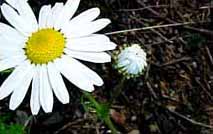Naturopathic health
Insomnia Alternative Treatments
Insomnia Herbal Remedies & Complementary Therapies
Insomnia affects 25% to 30% of people at some point in their lives and is often a reflection of how damaging a modern lifestyle can be. If you don't get enough sleep you can feel irritable, anxious or depressed. This page looks at how naturopaths and herbalists treat insomnia.
Insomnia, diet and lifestyle
If you suffer from insomnia your starting point should be to review your diet and lifestyle. The lifestyle section of this website contains some useful general advice for improving your approach to diet and exercise.
It may seem obvious, but many drinkers of caffeine based drinks such as coffee, tea and cola do not connect this habit with their insomnia. We recommend for those insomniacs that must take caffeine to take it in the form of green tea and not to drink any caffeine based drinks after 3.30 in the afternoon. Try drinking chamomile tea in the evenings instead. While some people find alcohol can help them to get to sleep it often results in sleeping for shorter periods and in the long run can add to an insomniac's problems.
Spicy foods such as chilli and curry can affect sleep patterns. Many people also find their sleep is affected by cheeses. Rich foods and heavy meals can also cause problems. Again, it is worth avoiding these foods in the evening if possible.
In addition to diet there can be other lifestyle factors that impact on insomnia. Stress, lack of exercise and inconsistent sleep patterns can all add to the problem of insomnia. While stress is not always avoidable it can be managed with the help of exercise and meditation activities such as yoga or qi gong. Insomniacs can also take control of their sleep patterns by getting up at the same time every day - even at the weekends! Going to bed at the same time every night allows the body to develop a routine. Herbal treatments for insomniaThere is scientific evidence that Valerian can be effective in the treatment of insomnia Herbalists also often prescribe chamomile tinctures for the treatment of insomnia. Drinking chamomile tea has been found to increase urinary levels of glycine, an amino acid that has been shown to relieve muscle spasms. Glycine is also known to act as a nerve relaxant, which may explain why the tea acts as a mild sedative. Chamomile teas and tinctures are also used by herbalists in the treatment of children's insomnia Other naturopathic treatments and insomniaBoth acupuncture and homeopathy can be used to treat insomnia Because naturopathic treatments look at the whole person and treat holistically, often individual aspects of the treatment do not stand up to conventional clinical trial using 'double blind' research techniques. This section will be developed to review how other naturopathic disciplines such as acupuncture and homeopathy treat insomnia. Naturopath's treat the whole person not just the disease or condition. That's why you cannot use this site for diagnosis or treatment. The information we provide should not be treated as a substitute for medical advice or treatment. We recommend that you visit a qualified naturopath or find a GP who is sympathetic to a naturopathic approach. Click here for our full disclaimer. |
Ailments
Information valerian herbal remedyInformation chamomile herbal remedyChamomile research
|
|
|
|
|
If you're starting to move towards a healthy diet and you want to take a major step forward then a detoxification programme can make a big difference. Click on the link below to find out more. Healthy Recipes Juicing SupplementsBach Flower Herbal Acupuncture Homeopathy DetoxificationMassage Qi Gong Nutrition & Diet Iridology Tissue Salts |










